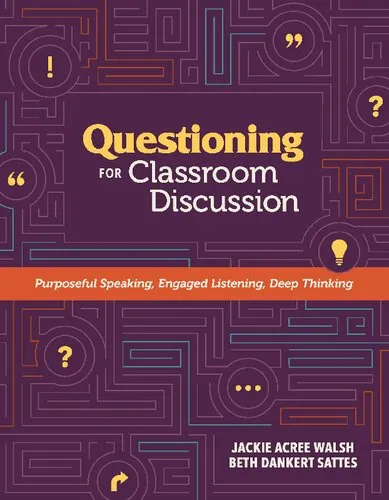Questioning for Classroom Discussion: Purposeful Speaking, Engaged Listening, Deep Thinking
4.6
Reviews from our users

You Can Ask your questions from this book's AI after Login
Each download or ask from book AI costs 2 points. To earn more free points, please visit the Points Guide Page and complete some valuable actions.Introduction to "Questioning for Classroom Discussion: Purposeful Speaking, Engaged Listening, Deep Thinking"
In "Questioning for Classroom Discussion: Purposeful Speaking, Engaged Listening, Deep Thinking," authors Jackie Acree Walsh and Beth Dankert Sattes provide an invaluable guide for educators who aim to foster meaningful classroom discussions that engage students in critical thinking, active listening, and reasoned speaking. The book serves as a practical manual, enriched with strategies and tools for educators who want to transform their classrooms into hubs of dynamic, student-centered conversations.
Rooted in research-backed practices, this book bridges the gap between theoretical understanding and day-to-day application in classrooms. It emphasizes the power of thoughtful questioning as a conduit for deeper understanding and meaningful dialogue. By harnessing the potential of skilled questioning and intentional facilitation, teachers are empowered to equip students with essential communication and analytical skills applicable far beyond the classroom.
This introduction provides a detailed summary of the book, its key takeaways, memorable quotes, and reasons why this book is critically relevant for today's educators.
A Detailed Summary of the Book
The book is structured around the premise that effective classroom discussions can ignite curiosity, deepen comprehension, and equip students with lifelong skills such as critical thinking, collaborative problem-solving, and articulate expression. The authors highlight the role of questioning as a core driver for stimulating and sustaining these discussions.
Walsh and Sattes explore different types of questions, from those designed to elicit recall to ones that provoke reflection and analysis. They present frameworks for teachers to craft and sequence questions that promote purposeful dialogue, while also ensuring all students have opportunities to participate actively. Moreover, the strategies address practical challenges, such as how to create an inclusive environment where students feel safe and valued as contributors.
A significant portion of the book deals with how teachers can facilitate engaged listening and respectful reasoning, teaching students to build on their peers' ideas and respectfully challenge different perspectives. The authors conclude with actionable steps and tools, empowering teachers to implement effective questioning techniques and cultivate vibrant classroom discussions.
Key Takeaways
- Effective questioning is the cornerstone of engaging and meaningful classroom discussions.
- Teachers play a crucial role as facilitators to ensure discussions remain inclusive and purposeful.
- Purposeful speaking, engaged listening, and deep thinking develop critical lifelong skills in students.
- Intentional planning and the use of structured questioning frameworks enhance discussion quality.
- A classroom culture built around trust and respect encourages active student participation.
Famous Quotes from the Book
"The aim of classroom discussion is not merely to find the correct answer but to deepen understanding and spark new connections."
"Good questions are the engine that drives great discussions."
"Perhaps the most important gift we can give our students is the ability to think critically, articulate their ideas, and engage respectfully with others."
Why This Book Matters
In an age where critical thinking, collaboration, and communication are increasingly vital, "Questioning for Classroom Discussion" equips educators with the tools to prepare students for the complexities of the 21st century. This book underscores the importance of dialogue in fostering intellectual engagement and social-emotional growth, providing an antidote to passive, surface-level learning dominated by rote memorization.
The strategies and techniques presented in the book help teachers transform their classrooms into spaces where students confidently explore complex ideas, respectfully navigate different viewpoints, and develop the ability to express their own reasoning with clarity and conviction. By placing students at the heart of learning through purposeful discussion, the book positions itself as an indispensable resource for educators striving for excellence in their teaching practice.
Ultimately, this book matters because it shifts the focus of education from providing answers to empowering students with the questions and skills they need to navigate a world full of challenges, uncertainties, and possibilities.
Free Direct Download
Get Free Access to Download this and other Thousands of Books (Join Now)
For read this book you need PDF Reader Software like Foxit Reader


